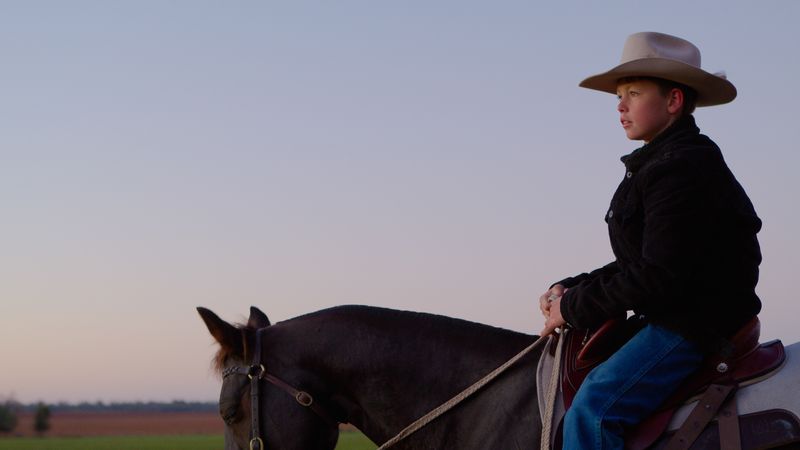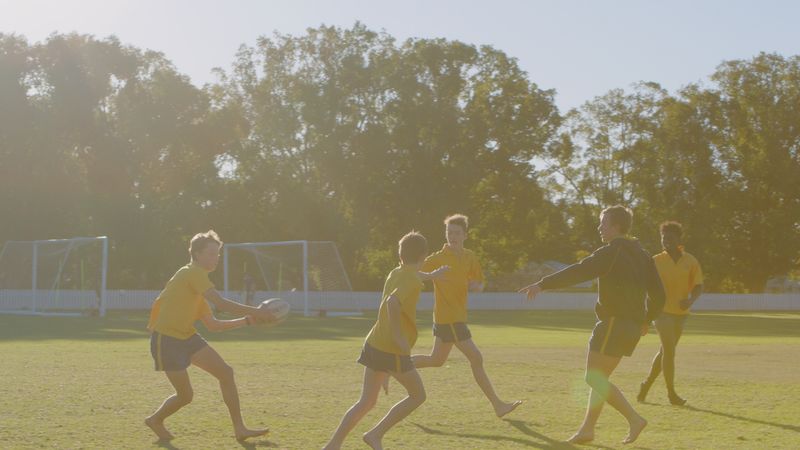“We acknowledge that you know your son, but we know boys and we know boarding. Let’s ensure that their care and wellbeing is a team effort.”— Mr Henry White, Head of House - Corfe

The transition into boarding can be a turbulent experience and it’s no secret that boarders who settle in quickly have often had ample opportunity to prepare.
In fact, I’ve coined the phrase “the clearer the runway, the smoother the landing” as a neat summary of this observation. A great deal of boarding experience can be initiated at home in the weeks and months leading up to your son’s departure, helping him prepare psychologically and logistically for his upcoming journey.
At TGS, we acknowledge that the boarding journey for boys and families starts long before they enter the house in late January. In the mind of a new boarder and their family, the transition into boarding school is a thought process that begins before enrolment and months, even years before they arrive. More often than not, it’s a process fraught with mixed anxieties and anticipation.
Our Corfe House staff have some key pieces of advice for new boarders and their families.
We want to get to know your son
Boarding is a fundamentally pastoral vocation; therefore, early and frequent communication between families and the boarding house is crucial for establishing firm bonds and understanding. Personally, I take any opportunity that allows me to connect with a prospective or incoming boarder. This can be through a phone call, email, or even a brief visit to the boarding house. However, what I most appreciate is a letter from your son introducing himself. Knowing his interests and hobbies enables me to cater to him more effectively within our program. Perhaps more importantly, understanding your son’s worries allows me to work with you and him to assuage any anxieties early on rather than letting them fester over the Christmas holidays.

Practice Makes Perfect
Corfe House runs on bells and whistles — routine is at the core of what we do. Once routines fall out of sync, we notice our boys tend to wobble. We follow the mantra “keep them busy and keep them informed” as we’ve noticed that moments of idle confusion, particularly upon arrival, often result in unfortunate periods of homesickness. Whilst routines are beneficial, they’re hard to master for a boy who’s never had one. As such, I recommend helping your son develop a routine and stick to it. A routine will ensure he prepares himself for the transition to boarding. It should include morning and evening bathing, bed-making, exercise, downtime and reading or study.
Moreover, in preparing psychologically for the boarding transition, any exposure to extended periods away from home in the lead-up is beneficial to boys prone to homesickness. If possible, organising a sleepover for your son or a few nights away from home with a friend or relative helps boys develop resilience.
Stay Busy
We acknowledge that any transition into a new home, routine and sudden immersion into a new community isn’t always a comfortable experience. This period of transition is an emotional one for all new boarders, each of whom approach this period in their own way, many of whom can become withdrawn and homesick. We encourage boys to stay busy – stay active – stay open-minded to new challenges and activities given to them – find joy in new tasks and with new people. By staying active, boys distract themselves from homesickness and through the process of time, we usually see these emotions subside as they familiarise themselves with their new environment and community.

Chunk It
We acknowledge that the emotional impact of transitioning into boarding is often exacerbated when boarders find themselves navigating new subjects, training schedules, friendship groups and the inevitable onset of fatigue. We encourage boys to pause, reflect and consider each task at hand – ask themselves: can it be broken or “chunked” into smaller, more manageable pieces? Often, we see that once boys have taken a moment to consider these things and focus on the single task at hand, the bigger picture doesn’t seem all that overwhelming anymore.
Transparency
We acknowledge that during a boy’s transition to boarding school, homesickness and anxieties are voiced over the phone to mums and dads, while a shield of stoicism and reticence is often held in the boarding house. This is a natural, yet unfortunate, part of the teething process that many of our boarders face in their transition. Firstly, please encourage your boys to speak with a trusted member of staff who can support them through the process. If we know about it – we can act on it. Secondly, don’t feel that you are betraying your son’s trust by keeping us informed of issues or concerns they relay to you. We are here to help. Open communication between the boarding house and families at home is fundamental to effective pastoral care and your son’s wellbeing.
Boarding is a Journey - Trust the Process
We acknowledge that in the life of a boarder, not every day is going to be a good one. Not every experience is going to be enjoyable. We encourage you to trust that our staff and systems are in place to support and facilitate growth and wellbeing. Boarding is a journey that is going to be rockier for some boys than others. It’s our role to guide them on course, but we need your trust and support in doing so.
For other useful articles about transitioning to boarding and the Senior School, visit the TGS Blog.
Latest Blog
Time for a Wake Up Call
Did you know that one in five 12–17-year-olds average over 8 hours of screen time a day? That means that in a 14-hour day, 57% of their waking hours involve looking at a screen! This madness is contributing to a very significant problem all teenagers face - sleep deprivation. It is killing us. We are becoming walking zombies rather than happy, growing lads. However, we can end this treacherous technological tyranny by putting down our screens before bed. Stop and think for a second. How much…
Breaking the Stigma
Strangling you in chains. Smothering you in despair. Anxiety and depression can be mighty beasts to break free from. Unfortunately, the state of traditional masculinity is reinforcing these chains. Mental health is a major threat to the well-being of men. This cage constructs barriers and borders which limit their ability to thrive in the modern world. Traditional Masculinity refers to a set of societal expectations foregrounded through the centuries by gender roles, stereotypes and beliefs.…
The Power of Gratitude
“What do you say mate?” your mum nudges you as the waitress hands you your dinosaur nuggets. “Thank you.” You have always been told to use good manners, and to say thank you, but what does thank you actually mean? Is it just two meaningless words uttered with monotonous regularity, or is it a tool that can alleviate mental health issues generating happiness and a sense of wellbeing? Gratitude is the sunlight that lights up those dark days. The ability to be grateful is at the core of personal…
The Silent Epidemic: Unveiling the Consequences of Sleep Deprivation
“Sleep that soothes away all our worries. Sleep that puts each day to rest. Sleep that relieves the weary laborer and heals hurt minds.” William Shakespeare (Macbeth, 1606) Heart Disease, Cancer, and Alzheimer's. Three life-threatening diseases. Three diseases all linked to lack of sleep. According to Dr. Okorie from the children’s health division of Stanford University, “7 out of 10 high school students are falling short of… (sleep) on school nights.” The Bulk of American teens are not getting…
Tik Tok - From Fun to Fear
Social media platforms have ingrained themselves into our daily lives in a time when technology is constantly evolving and drawing millions of users with seductive features and never-ending streams of captivating content. Among these, TikTok has become a worldwide phenomenon, captivating users with its viral challenges and short-form films. Underneath the fun and inventiveness however, there is growing concern about the risks connected to TikTok and other social media platforms. TikTok's…
Active Procrastination – Unlocking the Gates of Time
“Procrastination is like a credit card: it’s a lot of fun until you get the bill.” - Christopher Parker – professional actor. Unfortunately, procrastination is a term that we are all familiar with as students; the vast majority of us have experienced it firsthand. It saps our time and results like a parasite, a burden on its host. However, despite it’s reputation, recent studies have shown that when harnessed correctly, procrastination can be a powerful tool to improve both academic efficiency…
It Takes a Village...
The Toowoomba Grammar School Boarding community plays a pivotal role in shaping the young minds of our boarders and instilling values whilst creating a sense of mateship that can last a lifetime. The nurturing and supportive network of staff not only ensure a safe and structured environment but also cultivates a sense of belonging and camaraderie among the boys. ‘The staff supply the fuel to the ship but ultimately it is the boys who steer it and decide upon its final destination’. Our TGS…
Unlocking Literacy - The Big Six Elements for Your Child’s Reading Success
Literacy skills are a core component of each day for our students, and parents often ask how they can support this from home. I am delighted to share with our parent community the essential components that underpin successful reading development. These elements, known as the Big Six, provide a solid foundation for your son’s literacy journey. These critical building blocks include: Oral Language: Communication skills are the bedrock of reading. Encourage rich conversations with your child.…
The Journey of a Boarding Mother
When you look up mother in the dictionary it reads: female parent of a child. When you look up boarder, it simply reads: a child who lives away from home. So, put “boarder mother” together and we have: the female parent of a child who lives away from home – if only it were that simple. My definition of boarding mother is: a strong, dedicated unbelievably great female parent of a child who has the wisdom to put her son’s educational needs, wellbeing and lifelong endeavours before her own. A…